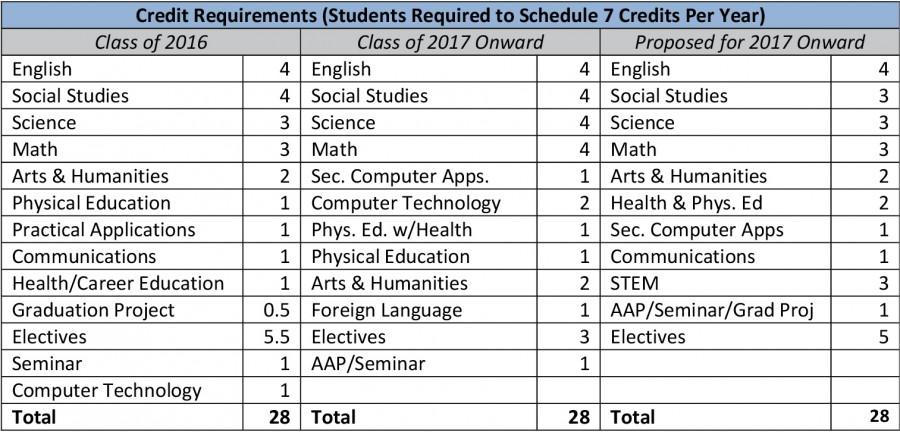New Graduation Requirements
Elective flexibility, STEM focus stressed for class of 2017 and beyond
Starting with the 2016-2017 school year, new graduation requirements, which are designed to emphasize schedule flexibility with core class and elective credits, will take effect.
The discussion about changing the requirements began early in the school year, when FHS Principal Mr. William Deal and the Principal’s Advisory Council (PAC), a group of students who discuss school concerns and projects with Deal, first met. At PAC’s Dec. 10, 2015 meeting, students brought up concerns about limited schedule flexibility.
“The requirements changed because the students and Mr. Deal wanted to see more flexibility within a student’s schedule. Before, it always seemed like we had very little room to do what we wanted and the rest was mandated by the school,” PAC President, Senior Brianna Frashure said.
On Jan. 14, the school board approved the graduation requirement changes.
The most noticeable changes to the requirements involve social studies, science and math, all of which will require three credits to graduate; previously, students in the class of 2017 and beyond were expected to have four credits in those subjects.
In addition, the requirements for two technology credits was eliminated. In place of the lost technology, science and math credits, students will need three credits in any Science, Technology, Engineering or Mathematics (STEM) course.
“We hear so much in education circles about how important STEM is, [and] there are so many jobs available now in the STEM areas where there aren’t students coming out of high schools and colleges with the skills to fill those jobs. So, we’re looking at that, saying, ‘This is a major need in our community. How can we, as a school, start to help fulfill that need for the benefit of our students?’” Deal said.
Previously, students were required to complete one foreign language. Because Freedom only offers Spanish, which is taught by Mr. Craig Bohon and Ms. Ruthanne Gudzan, more students signed up to take the class than what Bohon and Gudzan could teach. Now, Spanish counts as a Arts and Humanities credit, but students are not required to take the class to graduate.
“We had more students signed up to take Spanish than what we had staff and what we had room in the schedule to actually provide,” Deal said. As part of the new requirements, students must also take five unassigned electives.
Like previous school years, students will need to schedule for at least seven credits a year in order to earn 28 credits before graduation.
For all courses next school year, instead of midterm and final exams, students will take four quarterly exams. For the classes of 2017 through 2019, the four quarter grading periods will impact 20 percent of the final grade, or 80 percent combined, while the four exams will make up the remaining 20 percent. This gives students two more opportunities to impact their final grade than in previous years.
“All of us wanted midterms and finals to account for less than what they do. This is because one semester is a lot to be tested on,” Frashure said. “Mr. Deal suggested the quarterly exams, which everyone thought was a great idea.”
Beginning with next year’s freshman class, the class of 2020, even though each quarter grades will add to 80 percent of their final grade just the those of the classes of 2017-2019, the quarterly exams will only make up 10 percent. A culminating project will be the final 10 percent of the final grade.
“Because we have our freshmen team already established, most freshmen, as they go through the high school, take almost identical coursework,” Deal said. “That’s where it makes the most sense to start the culminating project because we need a lot of input from teachers. We need everybody to be on the same page.”
The culminating project, which will be enacted in all grade levels as the class of 2020 goes through high school, is based on the curriculum learned in the classroom.
“The idea behind the culminating project is there are elements of that project that you will
throughout the year as you move through your coursework,” Deal said. “When you do a test, you show you can do the problems [and] you show that you’ve learned, but the culminating project actually shows you can apply that knowledge.” Since the school board just approved the new graduation requirements in January, the culminating project will be undergoing development shortly.
Scheduling for the 2016-2017 school year is expected to start in early February. Students should expect an assembly to receive information about graduation requirements in the near future.
“I think it is really important for people to know that Mr. Deal has the biggest heart for what the students want and also need. It was important [for] PAC to be in on his changes because he really sat down with us and listened to everyone’s opinions. He really has the students’ interest in mind, and that showed throughout this entire process,” Frashure said.



